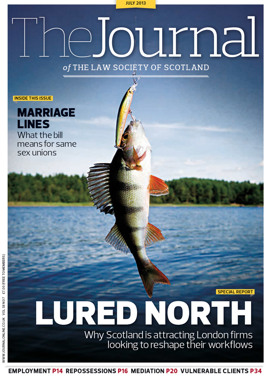Minimum gain

The Alcohol (Minimum Pricing) (Scotland) Act 2012 is already on the statute book, proposing a minimum sale price of alcohol of not less than £0.50 per unit. It was challenged in a judicial review taken at the instance of the Scotch Whisky Association.
The Outer House decision is now published: [2013] CSOH 70 (3 May 2013). Lord Doherty’s judgment is squeezed into 34 pages, despite exhaustive written submissions even before the seven days of hearing. Space permits only the briefest summary of the salient points.
It had been argued initially that this issue was not a devolved matter and was therefore outwith the legislative competence of the Scottish Parliament. As a similar argument had been rejected by the Supreme Court in the case of Imperial Tobacco Ltd v Lord Advocate 2013 SLT 2, this was not insisted on.
Restrictions on trade?
The first argument insisted on was based on the Act of Union of 1707. Articles 6 and 7 provide that all parts of the United Kingdom are to be under the same prohibitions, restrictions and regulations of trade, and liable to the same excise upon all excisable liquors. It was argued that if there were to be minimum pricing in Scotland but not in England, the result would be a disparity in the United Kingdom common market in alcoholic drinks. That argument was dismissed very shortly. Lord Doherty pointed out the historical context of articles 4 and 6. They are not relevant to freedom of trade, nor of the freedom of Scotland and England to pass quite separate laws on such matters as regulation of alcohol.
The next argument was under articles 34 and 36 of TFEU. Article 34 provides that “quantitative restrictions on imports and all measures having equivalent effect shall be prohibited between member states”. There seems to be some very strong support from the European Commission and from decisions of the European Court of Justice that minimum pricing will fall foul of article 34. Lord Doherty correctly does not consider the Commission’s views to be authoritative, and seemed to consider the ECJ cases inconclusive.
This part of the judgment could be clearer. Applying the European concepts of proportionality and margin of appreciation, the judgment seems to run as follows. Maybe the ECJ has views on minimum pricing, but it doesn’t know about the Scottish problems with alcohol. The Scottish ministers can balance the ECJ view with our health and societal issues (i.e. apply proportionality). Even if they haven’t got it quite right, they’re allowed some scope for error (i.e. a margin of appreciation).
Taxing questions
A whiff of hypocrisy is detected when the petitioners argue that the Government’s desired result could be achieved by raising excise duties. Their argument was that it would be a good thing if duties were raised instead. At the time of writing, a major supermarket is advertising a 70cl bottle of own label vodka for £10.90. Under the minimum price legislation, this would cost £14. The idea that the trade association would accept duty hikes of that magnitude is just laughable.
One of the counter arguments for the respondents was that there could be no guarantee that supermarkets would pass on duty increases to the customer. They might instead opt to keep alcohol at artificially low prices as a loss leader. This would not be possible under minimum pricing.
These were the main arguments. There were a few others, but these were mostly, pun intended, scraping the bottom of the barrel. At least one was described by his Lordship as a “startling proposition”.
One thing is certain – the Government has won the battle, but the war is far from over.
In this issue
- Credit hire: back to basics
- You know who I mean
- Behind all the fun
- Your Future in Law
- Reading for pleasure
- Opinion column: Cameron Fyfe
- Book reviews
- Profile
- President's column
- Mapping out the Crofting Register
- Back office bait
- Another bite at the cherry
- Security of your home
- Marriage redefined
- Building better business cultures
- Keeping a rein on child cases
- Minimum gain
- Beware LLP tax changes
- Framework remodelled
- Scottish Solicitors' Discipline Tribunal
- A Scottish ILG chair in New York
- Beneath the surface
- Being alert to the needs of the vulnerable
- Sins of our leaders
- How not to win business: a guide for professionals
- Litigation: a tight ship?
- Ask Ash
- Why sep rep?
- From the Brussels office
- Law reform roundup
- Diary of an innocent in-houser






